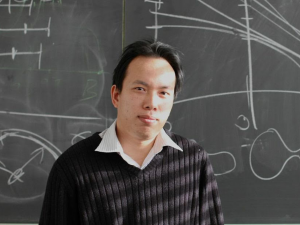On December 18, 2023, Dr. Pham Thanh Tri (Assistant Professor in Biology Department at Nazarbayev University) visited RCID and shared about his research relating to Carbon nanozyme.
Nanozymes have sparked substantial attention in recent years due to their ease of production, low cost, low toxicity, greater flexibility, high stability, and excellent optical properties. However, the impacts of nanozymes with substantial catalytic activity on cells have not been thoroughly investigated. Here, we investigated the effects of sulfur and nitrogen co-doped carbon nanoparticles (SN-CNPs) with strong phosphatase activity on Drosophila neural stem cells. Live cell imaging and atomic force microscopy were employed to evaluate the influence of SN-CNPs on the physical and mechanical properties of neural stem cells in both intact brain and in primary culture. Our live cell imaging data revealed that SN-CNPs induced hyperactive actomyosin contraction, resulting in actin cytoskeleton separation from the cell membrane and subsequent collapse. Additionally, it caused the depolymerization of microtubules, an increase in cell size, and ultimately the bursting of the membrane. The outcomes of the biochemical experiments revealed that SN-CNPs exhibit strong ATPase and GTPase activities. Thus, our SN-CNPs possessed two crucial biological enzymatic activities commonly observed in cells: ATPase and GTPase activities. Due to elevated level of ATPase and GTPase activities, the cell’s internal osmotic pressure increases, resulting in uncontrolled expansion and ultimately cell explosion. Our atomic force microscopy (AFM) studies also revealed that cells treated with SN-CNPs have much higher cortical stiffness than untreated cells. This study is the first to report the existence of carbon-based nanoparticles that have significant ATPase and GTPase activities, as well as a dual cell-destructive mechanism based on phosphatase activity. This novel class of carbon nanozymes has the potential to be used in cancer therapy.
Furthermore, these SN-CNPs demonstrated exceptional antibacterial activity, with MIC values of around 200 µg/mL for the majority of investigated bacterial strains. AFM studies of single bacterial cell revealed that after being treated with SN-CNPs, bacterial cells exhibit significant deformation and increased cortical stiffness. In addition, SN-CNPs also possess several peculiar characteristics, such as high concentration antibacterial action, low concentration bacterial growth stimulation, and enhancement of root branching in Arabidopsis thaliana. As a result, the use of nanoparticles as anti-cancer or anti-cancer drugs carriers raises a number of concerns that will need to be thoroughly investigated before clinical trials can start.

Dr. Pham Thanh Tri
Biography:
Tri T. Pham is an Assistant Professor in Biology Department at Nazarbayev University. He received a Double Degree in Advanced Science (Mathematics & Physics) and Aerospace Engineering from the University of Sydney, Australia. He received a Ph.D. in Computational Biophysics at Monash University, Australia. After stints in the USA and Switzerland (where he received a prestigious award from the Swiss National Science Foundation), he joined Nazarbayev University in August 2019. Dr. Pham has over 22 years of experience with computational simulations and at least 11 years of experience with live-cell imaging and biophysical measurements using optical microscopes and atomic force microscopy, with a focus on measuring the physical and mechanical properties of a single cell. He recently established the Mechanobiology Laboratory at NU to investigate changes in mammalian and bacterial cell biophysical properties, viability, and biofilm formation when they interact with therapeutic drugs, antibiotics, nanoparticles, nanomaterials, and material surfaces such as metal implants or polymer scaffolds.

